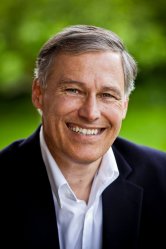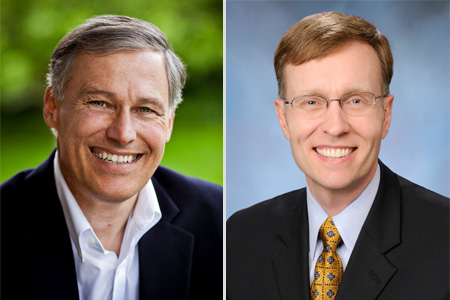All around the country this election season, we’ve got Democrats who don’t want to talk about climate change and Republicans who don’t even acknowledge that climate change is real.
But in the Washington state governor’s race, it’s a whole different ballgame. The Democrat, Jay Inslee, is a longtime, outspoken crusader for climate action and clean energy. The Republican, Rob McKenna, is one of a vanishing breed of Republicans who not only acknowledge that climate change is happening but support government action to fight it.
And they’re locked in one of the most competitive gubernatorial races of the year, vying to replace retiring Democrat Chris Gregoire.

Jay Inslee
Jay Inslee
Greens are positively swooning for Inslee. During more than a decade in the U.S. House representing areas north and west of Seattle, he pushed aggressively for climate legislation, environmental protections, federal support for cleantech, and a wholesale shift to a green economy. For Inslee, clean energy is not just another issue; it’s his motivating passion. He coauthored a book on the subject in 2007: Apollo’s Fire: Igniting America’s Clean Energy Economy. He cofounded the House Sustainable Energy Caucus. He’s written posts here at Grist calling for clean air, international climate action, and passage of his New Apollo Energy Act.
“I have a clear strategy to make Washington the national leader in clean energy technology,” Inslee recently told a Beyond Oil conference. His cleantech plan — part of his larger jobs plan [PDF] — calls for three years of tax breaks for clean-energy startups, among other new companies, and extension of existing tax breaks for renewables. Other strategies include encouraging energy efficiency, developing the state’s advanced biofuels industry, and investing in light rail and electric-vehicle infrastructure.
Ross Macfarlane of the Seattle-based nonprofit Climate Solutions calls Inslee “one of the two or three members of Congress from any state who is most informed and most [accomplished] in developing specific policies to drive the clean economy in really every relevant sector.”
Enviros and clean-energy entrepreneurs in Washington are pulling out all the stops to get Inslee into the governor’s mansion. Cleantech business leaders have praised and endorsed him. The Sierra Club’s state chapter is rallying its troops. Washington Conservation Voters (WCV) has raised about $750,000 for its PAC this year, and intends to spend the “vast majority” advocating for Inslee, says Executive Director Brendon Cechovic. The group has launched a pro-Inslee, anti-McKenna website and will do a big old-school push to directly hit up voters via snail mail, door knocks, and phone calls. “We view this as our highest priority in 30 years as an organization … a once-in-a-generation opportunity,” said Cechovic.
The national green community sees big stakes too. The D.C.-based League of Conservation Voters gave Inslee a full-throated endorsement, breaking its long-standing policy of not endorsing gubernatorial candidates. And it’s donated $250,000 to WCV’s PAC to help with the campaign.
Rob McKenna

Rob McKenna
McKenna is catching flack from enviros, but he’s not a mouth-breathing EPA-hater in the mold of congressional Republicans. As Washington’s attorney general, a post he’s held since 2005, he has supported the U.S. EPA’s authority to regulate greenhouse gases and defended tougher state-level auto-emissions standards, which have since been adopted by the Obama administration.
“He’s very enthusiastic about solar and wind and energy efficiency and integrating those with the state’s existing hydropower systems,” said Jim DiPeso of ConservAmerica, the group formerly known as Republicans for Environmental Protection.
Seattle Post-Intelligencer columnist Joel Connelly notes that McKenna also “supports the state Growth Management Act, praises its contributions to the Puget Sound area, and endorses work of the Washington Wildlife and Recreation Coalition. His first political work was for the 1989 Open Spaces initiative.”
But there are plenty of things on which McKenna and Inslee disagree.
McKenna is against cap-and-trade. He opposes government support for cleantech industries, employing the standard GOP argument that the government shouldn’t be in the business of “picking winners and losers” (never mind that it’s been funding the oil and coal industries’ wins for a century). He criticizes Inslee’s approach as “Solyndra-style economic policy.” And, though McKenna calls for targeted investments in transit, he’s been skeptical of a Seattle-area light-rail plan.
WCV criticizes McKenna for taking campaign money from polluting oil, gas, and timber companies and wanting to loosen the rules of the state’s renewable energy standard.
McKenna, for his part, calls himself a conservationist and says he’s following in the tradition of past Washington state Republicans, like former Gov. Dan Evans, who helped to establish wilderness areas and national parks in the state. “We need to recapture the big bipartisan spirit for conservation,” he said in May.
The choice
It’s no surprise that both the Democrat and the Republican in this race are talking up their eco-credentials. Washington state voters have traditionally been some of the greenest in the nation, second only to Californians, says Seattle-based Democratic consultant Tom Hujar. But this year environmental issues don’t seem to be as much of a priority for voters, he says.
At the moment, that doesn’t appear to be hurting Inslee; a new poll has him up by six points. But the race is still widely considered a toss-up, and Inslee and the Democrats aren’t taking anything for granted. They remember all too well that in 2004 Gregoire won the governor’s race by a mere 129 votes, one of the narrowest electoral victories in U.S. history.
If McKenna is elected, he could be the greenest Republican governor in the nation (which isn’t saying much, as Arnold Schwarzenegger and Charlie Crist have both been out of office for almost two years.)
If Inslee is elected, he could be the greenest governor in the nation, period.
—–
See also: David Roberts’ profile of Inslee



